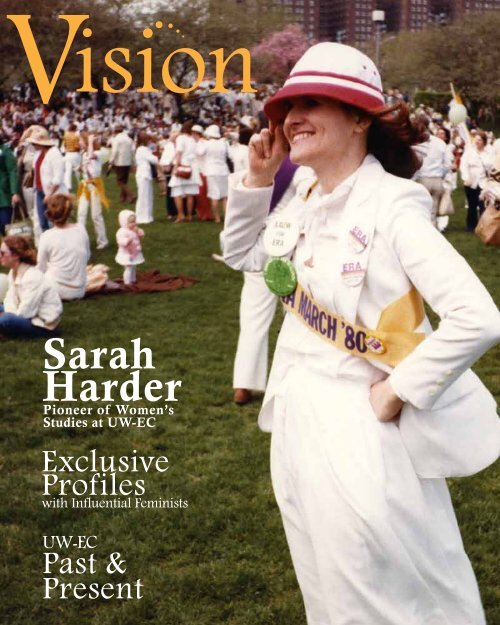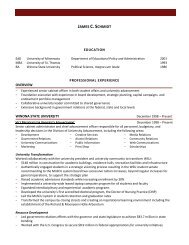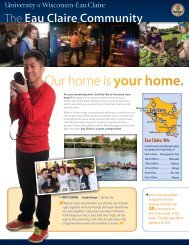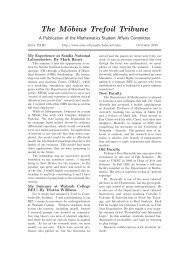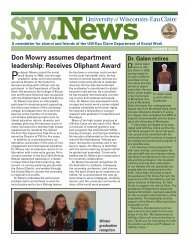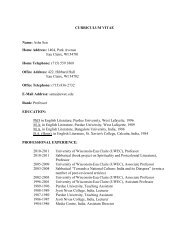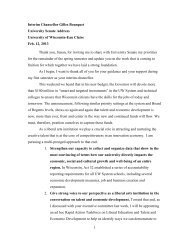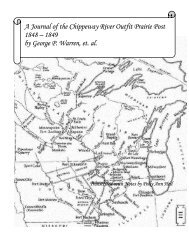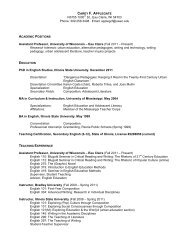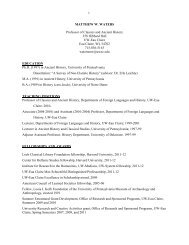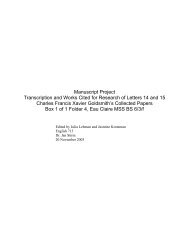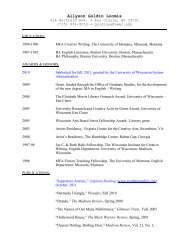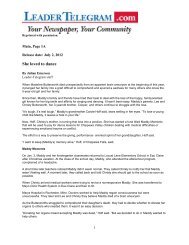Sarah Harder - University of Wisconsin-Eau Claire
Sarah Harder - University of Wisconsin-Eau Claire
Sarah Harder - University of Wisconsin-Eau Claire
Create successful ePaper yourself
Turn your PDF publications into a flip-book with our unique Google optimized e-Paper software.
Vision<br />
<strong>Sarah</strong><br />
<strong>Harder</strong><br />
Pioneer <strong>of</strong> Women’s<br />
Studies at UW-EC<br />
Exclusive<br />
Pr<strong>of</strong>iles<br />
with Influential Feminists<br />
UW-EC<br />
Past &<br />
Present
table<br />
OF contents<br />
Pr<strong>of</strong>iles<br />
2 <strong>Sarah</strong> <strong>Harder</strong><br />
By Marci Korb<br />
6 David Jones, Ph. D.<br />
By Abby Vercauteren<br />
7 Susan Turell, Ph. D.<br />
By Megan Cherrier<br />
8 Kaying Xiong, Ed. D.<br />
By Emily Wievel<br />
11 Rose-Marie Avin, Ph. D.<br />
By Laura Jones<br />
12 Barbara Blackdeer-Mackenzie<br />
By Tiffany Gerber<br />
13 Katie Bowman<br />
By Tiffany Gerber<br />
14 Carol Fairbanks, Ph. D.<br />
By Tiffany Gerber<br />
contributors<br />
Co-Publishers<br />
Ellen Mahaffy<br />
Dr. Katherine Rhoades<br />
Editor in Chief<br />
Rob Hanson<br />
Creative Director<br />
Laura Sadlier<br />
Marketing Directors<br />
Stefani Tauger<br />
Krista Zuba<br />
Managing Editor<br />
Joel Hrubesch<br />
Photography Editor<br />
Marguerite Berg<br />
Online Editor<br />
Liz Dohms<br />
Production Manager<br />
Andrea Thelen<br />
Art Director<br />
Danielle Biers<br />
1<br />
9 Then & Now: A Photo Essay<br />
By Danielle Biers and Andrea Thelen<br />
15 Elizabeth Jones Herlihy<br />
By Krista Zuba and Colleen McFarland<br />
UW-EC Special<br />
Collections Consultant<br />
Colleen McFarland<br />
Copy Editors<br />
Brent Brevak<br />
Emily Doud<br />
Tyler Leland<br />
Print & Web Contributors<br />
Megan Cherrier<br />
Tiffany Gerber<br />
Laura Jones<br />
Marci Korb<br />
Emily Wievel<br />
Abigale Vercauteren
harder<br />
SARAH<br />
By Marci Korb<br />
Photos By Ellen Mahaffy
As I awoke to the sound <strong>of</strong> my alarm, and the<br />
haze <strong>of</strong> sleep drifted away, my stomach turned. It<br />
was Feb. 27, 2009, and today I was interviewing<br />
<strong>Sarah</strong> <strong>Harder</strong>. The excitement and nervousness was<br />
too much to bear, so instead <strong>of</strong> hitting snooze like I<br />
usually do, I pushed back the covers and started to<br />
get ready. I was interviewing <strong>Sarah</strong> <strong>Harder</strong>. I had to<br />
say it again just to remind myself. The <strong>Sarah</strong> <strong>Harder</strong>,<br />
the very woman who<br />
served as the National<br />
Women’s Conference<br />
Committee-Co-Chair,<br />
participated on the<br />
National Peace Foundation board <strong>of</strong> directors,<br />
contributed significantly to national initiatives<br />
sponsored by the American Association <strong>of</strong> <strong>University</strong><br />
Women, and helped establish the women’s studies<br />
program at the <strong>University</strong> <strong>of</strong> <strong>Wisconsin</strong>-<strong>Eau</strong> <strong>Claire</strong>.<br />
When I arrived at Pr<strong>of</strong>essor <strong>Harder</strong>’s apartment<br />
for the interview she greeted me at the front door. I<br />
took <strong>of</strong>f my boots, which were full <strong>of</strong> snow, and she<br />
immediately <strong>of</strong>fered me a pair <strong>of</strong> her house slippers<br />
to wear. I knew instantly that I was going<br />
to like this woman. After a brief and<br />
somewhat formal introduction, we<br />
settled in at the kitchen table and<br />
began the interview…<br />
<strong>Sarah</strong> <strong>Harder</strong> was born on<br />
Sept. 9, 1937, in Chicago, Ill.<br />
She was born to a Swedish father<br />
and an Irish mother; both <strong>of</strong> whom<br />
recognized her brilliant and strong spirit<br />
while she was still very young. Her boldness was<br />
not always appreciated, and she admits, “I was<br />
always way too outspoken and could be counted on<br />
to say or do… sort <strong>of</strong> always the wrong thing at the<br />
wrong time.”<br />
Because <strong>of</strong> her outspokenness she always had<br />
a stormy relationship with her parents. This is best<br />
<strong>Sarah</strong> <strong>Harder</strong><br />
13<br />
portrayed in a story <strong>of</strong> her young childhood. When<br />
<strong>Harder</strong> was just two years old her Aunt Lucile came<br />
for a visit. When she arrived two-year-old <strong>Harder</strong> was<br />
in her room with the door shut screaming at the top <strong>of</strong><br />
her lungs. After some time her Aunt asked her father,<br />
“Aren’t you scared you are going to break her spirit?” To<br />
which he replied matter-<strong>of</strong>-factly, “No, but she sure is<br />
likely to break ours.”<br />
“ I was always way too outspoken and<br />
could be counted on to say or do…sort <strong>of</strong><br />
always the wrong thing at the wrong time.”<br />
Although <strong>Harder</strong><br />
had been knocking<br />
heads with her parents<br />
from the time she was a<br />
toddler, they were extremely proud <strong>of</strong> her for what she<br />
accomplished. Both <strong>of</strong> <strong>Harder</strong>’s parents encouraged and<br />
fostered her community activism. Her father ran a small<br />
town hardware store and was always an active member<br />
<strong>of</strong> the Lions Club. <strong>Harder</strong> recalls her father as, “a great<br />
community supporter, a great community activist.” Her<br />
mother, an extremely talented ballerina, founded her<br />
own dance school and later on helped with the family’s<br />
hardware store. However, <strong>Harder</strong> recognizes that her<br />
mother’s visibility really came from the work she did<br />
in the community. She <strong>of</strong>ten traveled around suburban<br />
Chicago towns and put on local school operettas with<br />
the kids; “extravaganzas,” as <strong>Harder</strong> recalls them.<br />
Obviously, in <strong>Harder</strong>’s case, the apple did not fall<br />
far from the tree.<br />
Education played a significant role<br />
throughout <strong>Sarah</strong> <strong>Harder</strong>’s life. She did well in<br />
school, but moving to a small town when she was<br />
nine threw her <strong>of</strong>f balance. While understanding<br />
teachers gave support, she did not have many friends.<br />
<strong>Harder</strong> recalls feeling like an “outsider” in high school<br />
despite her active participation--something many<br />
intelligent adolescent women can relate to in our society.<br />
<strong>Sarah</strong> <strong>Harder</strong> went to college at the <strong>University</strong> <strong>of</strong><br />
Iowa. She attended college for just over two years and<br />
in 1958 married her first husband. She then moved to<br />
La Crosse, Wis. After the birth <strong>of</strong> two children and the
dissolution <strong>of</strong> her marriage, <strong>Harder</strong> went back to<br />
finish her undergraduate work at the <strong>University</strong> <strong>of</strong><br />
<strong>Wisconsin</strong>-La Crosse; earning a B.S. and B.A.with<br />
double-majors in history and English in 1963. This<br />
was a significant feat for any woman <strong>of</strong> the time<br />
period, much less a young single mother. In 1966,<br />
<strong>Harder</strong> earned her Master’s degree in English at<br />
Bowling Green State <strong>University</strong>, where she’d met<br />
and married her second husband and had another<br />
child. In 1968 <strong>Harder</strong> and her husband joined the<br />
English department at the <strong>University</strong> <strong>of</strong> <strong>Wisconsin</strong>-<br />
<strong>Eau</strong> <strong>Claire</strong>—she as a temporary instructor; he on a<br />
tenure track. <strong>Harder</strong> notes that this time marks the<br />
beginning <strong>of</strong> her “awakening” to feminism.<br />
In 1971 <strong>Sarah</strong> <strong>Harder</strong> faced her first challenges.<br />
While pregnant with her fourth child, <strong>Harder</strong><br />
requested two weeks’ sick leave for the birth.<br />
The request was denied, as pregnancy was not<br />
accepted within the UW System sick leave policy.<br />
<strong>Harder</strong> contacted acting UWEC chancellor to<br />
challenge this ruling but was still denied sick leave<br />
for childbirth. She and her husband decided to<br />
appeal that policy to the UW System. The issue<br />
dragged on and on, and with her due date quickly<br />
approaching she decided to take matters into her<br />
own hands. She went to the acting Chancellor again<br />
and this time said, “I just want you to know that<br />
if nothing changes before I go into the hospital, I<br />
will be calling the local press and will be returned<br />
by ambulance to my classroom with the press corps<br />
on my heels.” <strong>Harder</strong> recalls that things suddenly<br />
changed after this encounter,<br />
and it was not long until the<br />
UW System’s entire maternity<br />
leave policy changed.<br />
This was not the only<br />
significant change <strong>Harder</strong><br />
made during her thirty-four<br />
years <strong>of</strong> employment at UW-<br />
<strong>Eau</strong> <strong>Claire</strong> where she was<br />
<strong>Sarah</strong> <strong>Harder</strong><br />
1<br />
very involved with activism on behalf <strong>of</strong> international,<br />
national as well as community causes.<br />
On the community level, <strong>Harder</strong> co-created the<br />
“Choices and Challenges Program,” which was directed<br />
towards young girls who benefited from the program’s<br />
emphasis on an array <strong>of</strong> career opportunities. The<br />
program By Marci encouraged Korb pre-adolescent and adolescent<br />
girls to “try on” three or four different occupations by<br />
shadowing real career women. The program allowed<br />
them to see the opportunities that abounded in addition<br />
to the roles <strong>of</strong> “wife” or “mother.”<br />
Another population <strong>Harder</strong> fought for in <strong>Eau</strong> <strong>Claire</strong><br />
was the “non-traditional” students who attended to the<br />
<strong>University</strong>. She helped numerous programs sprout in<br />
order to help returning students transition back into the<br />
academic realm. <strong>Harder</strong> found this program especially<br />
useful for women who, like herself, had dropped out <strong>of</strong><br />
college to get married. It created a life-line for those who<br />
wanted to rise above poverty and economic dependence<br />
but simply did not have the support system to do so.<br />
When referring to this issue <strong>Harder</strong> stated, “I am<br />
convinced that everybody has the capacity to contribute<br />
to society, but too <strong>of</strong>ten existing barriers just do not let<br />
people get to that point.”<br />
While <strong>Sarah</strong> <strong>Harder</strong> was striving to make the<br />
community <strong>of</strong> <strong>Eau</strong> <strong>Claire</strong> a better place for women, she<br />
was also doing extensive work outside <strong>of</strong> <strong>Eau</strong> <strong>Claire</strong>.<br />
In 1977 she attended her first national convention<br />
<strong>of</strong> the American Association for <strong>University</strong> Women<br />
(AAUW). That year she was also an elected delegate for<br />
the National Women’s Conference in Houston, Texas<br />
sponsored by the U.S. Congress. This <strong>of</strong>ficial<br />
U.S. conference identified changes needed<br />
to assure the full participation <strong>of</strong> women in<br />
American Life, with its results reported to<br />
President Carter and the Congress.<br />
In 1979 <strong>Harder</strong> was elected co-chair <strong>of</strong> the<br />
National Women’s Conference Committee,<br />
and with university support started running<br />
the committee out <strong>of</strong> her <strong>of</strong>fice <strong>of</strong> Affirmative Action
and Educational Opportunity at UW-<strong>Eau</strong> <strong>Claire</strong>.<br />
She helped to found the <strong>Wisconsin</strong> Women’s<br />
Network in 34 state capitols with NWCC, then was<br />
appointed by Governor Earl as first chair <strong>of</strong> the<br />
<strong>Wisconsin</strong> Women’s Council.<br />
<strong>Harder</strong> pushed to create the women’s studies<br />
program at UW-<strong>Eau</strong> <strong>Claire</strong>, based upon her<br />
understanding <strong>of</strong> public resistance to feminist change,<br />
“this emerging academic discipline contributed<br />
first by constructing a statistical base from which to<br />
demonstrate the need for changes women activists<br />
were arguing for and to construct a theoretical base<br />
to give these changes full legitimacy.”<br />
In 1985, <strong>Sarah</strong> <strong>Harder</strong> was elected national<br />
President and Board Chairman <strong>of</strong> the AAUW’s<br />
Educational Foundation and served in this position<br />
until 1989. At one time she was responsible for<br />
150,000 members located in 1,900 different branches<br />
around the country. In 1989, when her term as<br />
President <strong>of</strong> AAUW came to an end, she returned to<br />
the National Women’s Conference Committee which<br />
she still chairs today.<br />
<strong>Sarah</strong> <strong>Harder</strong> was also making waves<br />
internationally during this time. In 1989 she joined<br />
the Board <strong>of</strong> Directors for the National Peace<br />
Foundation in Washington, D.C, and still serves as<br />
President. During her 20 years with this foundation,<br />
<strong>Harder</strong>’s work in Russia has emphasized social<br />
projects, women’s political and civic forums, as well<br />
as coalition building, peace-building and conflict<br />
resolution. She has worked extensively throughout<br />
Russia and still remains active there today.<br />
According to <strong>Harder</strong>, the biggest thing she<br />
accomplished throughout her years <strong>of</strong> activism<br />
was to show the power <strong>of</strong> coalition building and to<br />
construct a set <strong>of</strong> principles which can help NGO<br />
groups to determine where best to direct activism in<br />
order to produce political change. These principles<br />
adopted by the AAUW are still used today.<br />
<strong>Sarah</strong> <strong>Harder</strong><br />
5<br />
When asked about the purpose and direction <strong>of</strong><br />
present day feminism, <strong>Sarah</strong> <strong>Harder</strong> <strong>of</strong>fers some vital<br />
wisdom. She believes we need to encompass the broader<br />
issues, pull together, and include men. <strong>Harder</strong> coined<br />
the term “feminization <strong>of</strong> power” in order to make a<br />
distinction between stereotypical male power that tends<br />
to exclude or impose. <strong>Harder</strong> states, “feminization <strong>of</strong><br />
power uses the power <strong>of</strong> inclusion and engagement with<br />
the understanding that the more you bring together, the<br />
more energy you create.” Although <strong>Harder</strong> understands<br />
that male-model power tends to look and act differently,<br />
she proudly states that some <strong>of</strong> the best feminists in her<br />
life, some who have made the greatest difference, have<br />
been men.<br />
She has a lot <strong>of</strong> faith in the women’s studies<br />
program at UW-<strong>Eau</strong> <strong>Claire</strong> and in the university as<br />
a whole. She believes that the direction the women’s<br />
department is headed is “terrific.” She states, “The<br />
women’s studies faculty are brilliant people … incredible<br />
resources for the university.” When referring to UW-<br />
<strong>Eau</strong> <strong>Claire</strong>’s overall ability to educate she says, “What<br />
is obvious to me is that this university can turn out the<br />
best and the brightest, especially when the best and<br />
the brightest are students that nobody ever expected to<br />
achieve.” Determination to turn out the best students<br />
is key to <strong>Harder</strong>’s career and her passion for making<br />
change. She has truly brought an incredible source <strong>of</strong><br />
change to the <strong>University</strong> <strong>of</strong> <strong>Wisconsin</strong>-<strong>Eau</strong> <strong>Claire</strong>.<br />
I am extremely proud to be graduating as a<br />
Women’s Studies major in the program <strong>Sarah</strong> <strong>Harder</strong><br />
helped found twenty five years ago. I had the privilege <strong>of</strong><br />
meeting with and interviewing <strong>Sarah</strong> <strong>Harder</strong> and by the<br />
time our interview ended I had learned an unspeakable<br />
amount about life, community, and activism. We met as<br />
strangers that day, but parted as friends--with a hug and<br />
future plans for a vegan lunch.<br />
<strong>Sarah</strong> <strong>Harder</strong> currently lives in <strong>Eau</strong> <strong>Claire</strong>,<br />
<strong>Wisconsin</strong>. She is the mother <strong>of</strong> 4 children and<br />
grandmother to 11 grandchildren. She still remains<br />
active in her community at the age <strong>of</strong> 71.
David Jones<br />
Day DAVID In the Life<br />
Jane Doe<br />
with Ph. D.<br />
jones<br />
By Abby Vercauteren<br />
Dr. David Jones was born on Oct. 20, 1963 in<br />
Omaha., Neb The youngest <strong>of</strong> four children, Jones<br />
was raised primarily by his mother.<br />
While he was in middle and high school, efforts<br />
were underway to racially integrate the public<br />
school system,,which presented challenges to Jones<br />
as an African American student, but also <strong>of</strong>fered<br />
him valuable insights into the various systems <strong>of</strong><br />
inequality that exist in society.<br />
After completing an English education degree<br />
at the <strong>University</strong> <strong>of</strong> Iowa, Jones finished a graduate<br />
program at the <strong>University</strong> <strong>of</strong> Nevada-Las Vegas in<br />
1990 and moved to Minneapolis, where he taught<br />
part time and also served as a program assistant and<br />
activity advisor at the <strong>University</strong> <strong>of</strong> St. Thomas and<br />
Minneapolis Community College. In 1994, Jones<br />
began a doctorate program in literature and African<br />
American studies at the <strong>University</strong> <strong>of</strong> Minnesota,<br />
which he completed in 2000.<br />
Shortly after receiving his Doctoral Degree,<br />
David began his career at <strong>University</strong> <strong>of</strong> <strong>Wisconsin</strong>-<br />
<strong>Eau</strong> <strong>Claire</strong>. During his nine years at UW-<strong>Eau</strong> <strong>Claire</strong>,<br />
he has taught both undergraduate and graduate<br />
level English courses, as well as six women’s studies<br />
courses. Although each women’s studies course<br />
has been different, all have been umbrella designs<br />
under the course African American Feminism in<br />
the Humanities. Specific courses have addressed<br />
issues such as black women in American film and<br />
1<br />
sexism during the 1960s. By teaching in both English<br />
and women’s studies, Jones has helped bridge the gap<br />
between humanities and social sciences. Through<br />
his utilization <strong>of</strong> teaching methods that incorporate<br />
music and mass media imagery, he also has <strong>of</strong>fered<br />
women’s studies courses a perspective informed by<br />
contemporary culture. In addition to teaching, Jones<br />
has written numerous essays about African American<br />
feminism and is part <strong>of</strong> the <strong>Wisconsin</strong> Coalition<br />
Against Domestic Violence, which addresses domestic<br />
violence in African American families.<br />
During his time at UW-EC, Jones has witnessed<br />
growing interest in women’s studies and feminism. He<br />
believes that women’s studies courses <strong>of</strong>fer students<br />
an opportunity for personal growth and activism, as<br />
well as an educational perspective that is a necessary<br />
component <strong>of</strong> a liberal arts education. Although the<br />
feminist movement has made great progress in recent<br />
years, Jones believes that forming more inclusive<br />
coalitions is a necessary component for further success.<br />
Inspired by feminists such as June Jordan and Angela<br />
Davis, as well as the strength <strong>of</strong> his own mother, Jones<br />
has succeeded in finding his own voice in feminism,<br />
the uniqueness <strong>of</strong> which has <strong>of</strong>fered an invaluable<br />
perspective to the women’s studies program.
Dr. Susan C. Turell was born on July 10, 1956<br />
in Cleveland, Ohio to a Jewish family. Four years<br />
later she moved to Houston, Texas where she resided<br />
throughout her childhood years. She feels that being<br />
Jewish is not just about religion, but it is about culture<br />
as well. Her family and community encouraged her<br />
to pursue an education and embrace Jewish values<br />
which remain a source <strong>of</strong> strength for her. Turell<br />
earned a Bachelor <strong>of</strong> Arts degree with honors from<br />
the <strong>University</strong> <strong>of</strong> Texas and a Master’s degree in<br />
counseling from the <strong>University</strong> <strong>of</strong> Houston before<br />
earning a Ph.D. from the <strong>University</strong> <strong>of</strong> Houston in<br />
counseling in 1992.<br />
Turell credits her Jewish upbringing with<br />
introducing her to social justice concerns. Community<br />
members in the Houston suburb <strong>of</strong> Meyerland<br />
where she grew up welcomed all people with diverse<br />
viewpoints. Growing up during the 1960s-1970s,<br />
Turell witnessed a great deal <strong>of</strong> discrimination in<br />
other social settings, although she noted that she did<br />
not have the language to understand the dynamics<br />
<strong>of</strong> oppression until she was a college student. Turell<br />
credits her grandmother, a progressive thinker,<br />
feminist, and life-long learner with teaching her<br />
feminist insights. Turell further developed her<br />
feminist values and knowledge <strong>of</strong> feminism when<br />
Susan Turell<br />
1<br />
SUSAN<br />
turell<br />
By Megan Cherrier<br />
Ph. D.<br />
at 26, she worked at the Houston Area Women’s Center<br />
in Texas. From this beginning, Turell has become a<br />
leading activist and academic voice working to promote<br />
social change through feminism, particularly in efforts to<br />
prevent violence against women. Turell spent ten years<br />
at the <strong>University</strong> <strong>of</strong> Houston-Clear Lake and six years<br />
as the Coordinator <strong>of</strong> the women’s studies program and<br />
as a pr<strong>of</strong>essor in women’s studies and psychology at the<br />
<strong>University</strong> <strong>of</strong> <strong>Wisconsin</strong>-<strong>Eau</strong> <strong>Claire</strong> before becoming the<br />
Interim Associate Vice Chancellor for Academic Affairs<br />
and Dean <strong>of</strong> Undergraduate Education, a position she<br />
assumed in summer 2008.<br />
Living as a feminist makes a big difference in Turell’s<br />
life. She thinks that great achievements have resulted from<br />
feminist work in the past 40 years but she also believes<br />
that there is much more to be done. She is encouraged<br />
by the gains women have made in areas such as access to<br />
employment and by society’s greater awareness <strong>of</strong> rape,<br />
sexual assault, sexual harassment, and abuse. On the<br />
other hand, she believes that we still live in a patriarchal<br />
world, where the current system for preventing violence<br />
against women does not always work. Turell wants things<br />
to change and envisions a future where women will<br />
gain control over their reproductive lives and sexualities<br />
and imagines a world where more women will occupy<br />
equitable positions in the workforce. Turell is committed to<br />
being part <strong>of</strong> the change she wants to see by encouraging<br />
people not to be afraid <strong>of</strong> everything feminism entails—“it<br />
is not just about women” but all the ways people may<br />
face discrimination because <strong>of</strong> race, ethnicity, social class,<br />
sexuality and/or other layers <strong>of</strong> their social identities.
KAYING<br />
xiong<br />
By Emily Wievel<br />
Kaying Xiong<br />
Ed. D.<br />
Not many women can tell the story that Dr.<br />
Kaying Xiong has actually lived. Kaying Xiong<br />
was born August 23, 1972, in Long Cheng, Laos,<br />
during the Vietnam War. She immigrated to the<br />
United States with her family in 1978, when she<br />
was only six years old. The family had left Laos to<br />
travel to Thailand, leaving with thousands <strong>of</strong> other<br />
refugees. The family lived in Illinois before moving<br />
to <strong>Wisconsin</strong>, finally calling <strong>Eau</strong> <strong>Claire</strong> home. Xiong<br />
was young when her family moved here, but she can<br />
clearly remember what it felt like to make a new life<br />
in a country where she was not born.<br />
The early 1980s in <strong>Eau</strong> <strong>Claire</strong> was not the<br />
easiest environment for a Hmong family. Racism,<br />
intolerance, and language barriers were among some<br />
<strong>of</strong> the obstacles faced by Xiong and her family. For<br />
example, Xiong remembers as a child not playing<br />
outside, as her parents were more than a little scared<br />
about their young children being victimized for being<br />
different, for being a minority in a town <strong>of</strong> majorities.<br />
Xiong explained, “Being a minority in a town like<br />
<strong>Eau</strong> <strong>Claire</strong>, you always feel inferior. Period.”<br />
As the second oldest child with three brothers<br />
and five sisters, Xiong felt a strong family bond<br />
growing up, and the family was very tight knit.<br />
Xiong grew up in a strict but loving household, and<br />
remembers her parents instilling and teaching the<br />
ethics <strong>of</strong> hard work and determination. They only<br />
had each other, and Xiong remembers not feeling<br />
very connected to the neighborhood she grew up in,<br />
1<br />
8<br />
although she felt differently about the community. She<br />
remembers her mother going to adult language classes<br />
at the Parks and Recreation, and to Savior’s Lutheran<br />
Church where her mother could get second hand<br />
clothing for the always growing kids in the family.<br />
Now after earning a bachelor’s degree in<br />
elementary education at <strong>University</strong> <strong>of</strong> <strong>Wisconsin</strong>-<strong>Eau</strong><br />
<strong>Claire</strong>, a master’s degree in educational administration<br />
from UW-Superior, and a doctorate in education at<br />
Hamline <strong>University</strong>, Xiong is the principal <strong>of</strong> Locust<br />
Lane Elementary School, a job that she loves and has<br />
worked hard to get to. Xiong said that race played<br />
a significant role in shaping who she was—she was<br />
forced to learn survival skills to get through life and<br />
school, so that she could find educational opportunities<br />
to exercise her full potential and get where she wanted<br />
to be. “To move yourself ahead is really one <strong>of</strong> the only<br />
ways to outlive some <strong>of</strong> those things,” Xiong said about<br />
being discriminated against. Xiong has worked to find<br />
balance in her life—balance between family, career,<br />
education, and being a Hmong woman. She embodies<br />
feminist ideals in a calm and comforting way—with<br />
shaping her struggles into lessons, being an educated<br />
and successful career woman, taking care <strong>of</strong> her three<br />
children and husband, and making it all look seamless.
Then & Now: A Photo Essay<br />
1<br />
Photo Essay by Danielle Biers & Andrea Thelen
THEN<br />
& UWEC:<br />
Now<br />
1<br />
A Historical Comparison
Dr. Rose-Marie Avin describes herself as a<br />
Caribbean American descendent <strong>of</strong> slaves who was<br />
born in Port-au-Prince, Haiti. Her upbringing in<br />
Haiti, including the treatment <strong>of</strong> the servants in her<br />
home and the climate that existed during a time <strong>of</strong><br />
despotism in her home country, remain significant<br />
memories that inform her life today.<br />
She speaks <strong>of</strong> strong role models during her<br />
childhood, including her mother and her aunt who<br />
taught her that, “Education is so important, it is<br />
important to get that degree.” Avin understood at a<br />
young age her responsibility<br />
to be educated and she<br />
graduated Summa Cum<br />
Laude from City <strong>University</strong><br />
<strong>of</strong> New York in 1978 and<br />
earned her Ph.D. from the<br />
<strong>University</strong> <strong>of</strong> Maryland<br />
in 1986. Moving forward in economics, a field<br />
traditionally dominated by men, Dr. Avin came to<br />
<strong>University</strong> <strong>of</strong> <strong>Wisconsin</strong>-<strong>Eau</strong> <strong>Claire</strong> in a tenure-track<br />
faculty position in 1987.<br />
Avin’s introduction to Nicaraguan women’s<br />
movements in 1989 became a turning point for her<br />
as she discovered the power <strong>of</strong> feminism. Affected<br />
by her journeys and interactions with women in<br />
Rose-Marie Avin<br />
ROSE-MARIE<br />
avin<br />
By Laura Jones<br />
“ I believe that one <strong>of</strong> my goals,<br />
as a feminist economist, is to<br />
eliminate the conditions <strong>of</strong><br />
women in the developing world.”<br />
11<br />
Ph. D.<br />
Nicaragua after the revolution, Avin discovered a new<br />
framework through the empowerment <strong>of</strong> these women<br />
that has enhanced her own scholarly work as well as her<br />
approaches to teaching economics. In 1992 she attended<br />
an “overflowing” conference session on feminism<br />
and economics and also began a relationship with the<br />
women’s studies program that led to her teaching classes<br />
and helping to coordinate an annual conference on<br />
feminist economics that explores the impact <strong>of</strong> women,<br />
who were previously invisible in traditional economic<br />
studies. When asked about her beliefs within feminism,<br />
Avin remarked, “I strongly believe in the activist side <strong>of</strong><br />
feminism. I believe that one <strong>of</strong> my goals, as a feminist<br />
economist, is to eliminate the conditions <strong>of</strong> women in<br />
the developing world.”<br />
Avin has received a<br />
Fulbright-Hays Seminars<br />
Abroad Award and The Morton<br />
Wollman Medal for Excellence<br />
in Undergraduate Study in<br />
Economics. She is also a member<br />
<strong>of</strong> the American Association <strong>of</strong><br />
<strong>University</strong> Women, the Center for Latin America at UW-<br />
Milwaukee, the Committee on the Status <strong>of</strong> Women in<br />
the Economics Pr<strong>of</strong>ession, the International Association<br />
for Feminist Economists (IAFFE) and The <strong>Wisconsin</strong><br />
Coordinating Council on Nicaragua (WCCN).
Barbara Blackdeer-Mackenzie<br />
BARBARA<br />
blackdeer-<br />
mackenzie<br />
By Tiffany Gerber<br />
Barbara Blackdeer-Mackenzie grew up in<br />
La Crosse, Wis. in a small, rural community.<br />
Coming from a dual ethnic background, Blackdeer-<br />
Mackenzie grew up in Norwegian, “white” ways as<br />
well as traditional Ho-Chunk ways, she said. Both<br />
<strong>of</strong> her parents were politically active within their<br />
community, and displayed strong democratic beliefs,<br />
influencing Blackdeer-Mackenzie in many ways,<br />
both spiritually and mentally.<br />
After high school, Blackdeer-Mackenzie<br />
received her B.A. at<br />
Winona State <strong>University</strong> in<br />
Communications and History,<br />
and she received her masters<br />
in education and pr<strong>of</strong>essional<br />
development at the <strong>University</strong><br />
<strong>of</strong> <strong>Wisconsin</strong>-<strong>Eau</strong> <strong>Claire</strong>. Blackdeer-Mackenzie is<br />
currently working on her education specialist degree<br />
at Winona State <strong>University</strong>.<br />
Blackdeer-Mackenzie worked for the<br />
Ho-Chunk Nation from 1995-1998, and again in<br />
2000-2001. She was a practicing journalist and<br />
public relations person to the presidential staff at<br />
Ho-Chunk Nation. It was while she was working<br />
for her tribe that she decided to help educate future<br />
journalists, to make sure Native Americans are<br />
correctly represented within the media.<br />
Blackdeer-Mackenzie came to UW-<strong>Eau</strong> <strong>Claire</strong><br />
as the Knight Journalist in Residence through the<br />
“ It was just so amazing and for<br />
the first time in my life, and I do<br />
mean my entire life, I felt like<br />
I belonged to a community.”<br />
1<br />
communication and journalism department. And<br />
soon after began to teach several communication and<br />
journalism, women’s studies and American Indian<br />
studies courses, from 2001-2004. While teaching, she<br />
realized the courses were lacking in training students<br />
to understand different cultures, and how to focus<br />
their education using a<br />
multicultural approach.<br />
Blackdeer-Mackenzie<br />
received the Excellence <strong>of</strong><br />
Service-Learning as Faculty<br />
Mentor award in 2002.<br />
In 2006, she received the UW System Outstanding<br />
Women <strong>of</strong> Color in Education award.<br />
“It was just so amazing and for the first time in my<br />
life, and I do mean my entire life, I felt like I belonged<br />
to a community, because here was all <strong>of</strong> these women<br />
from around the state honored by the UW Systems<br />
and their different universities ... doing all these<br />
different works in different ways to help people, to help<br />
students,” Blackdeer-Mackenzie said.<br />
Blackdeer-Mackenzie also organizes the First<br />
Nation New Nation conference, which brings together<br />
the greater Hmong community and the media.
KATIE<br />
Katie Bowman is an <strong>Eau</strong> <strong>Claire</strong> native. She<br />
grew up in the town <strong>of</strong> Washington. Bowman<br />
received her B.A. in English literature, with a<br />
minor in women’s studies from the <strong>University</strong> <strong>of</strong><br />
<strong>Wisconsin</strong>-<strong>Eau</strong> <strong>Claire</strong> in the spring <strong>of</strong> 2006, and<br />
her M.A. in women’s studies from Minnesota State<br />
<strong>University</strong> in Mankato, Minn., in the spring <strong>of</strong> 2008.<br />
She taught at Michigan State <strong>University</strong> during the<br />
2008 fall semester as an adjunct faculty member<br />
after she graduated. Bowman then took a job under<br />
Susan Turell as adjunct in the women’s studies<br />
department. She currently is teaching women’s<br />
studies 210, Culture <strong>of</strong> Third Wave Feminism.<br />
As a child, Bowman did not see herself as<br />
becoming a feminist. She grew up in a middle-<br />
class community surrounded by<br />
privilege. Bowman did not have<br />
a sudden “a-ha” moment that<br />
made her change her mind; she<br />
describes it as a process. While<br />
in her teens, Bowman began to<br />
listen to rebellious, anti-establishment musicians.<br />
“Music really helped me to see things I hadn’t seen<br />
before, that had been invisible to me,” Bowman<br />
said. She began to make connections about social<br />
injustice. When she came to UW-<strong>Eau</strong> <strong>Claire</strong>, she<br />
immediately immersed herself in women’s studies<br />
courses and became president <strong>of</strong> the College<br />
Feminists. Bowman is now a committed feminist<br />
and brings that perspective to every aspect <strong>of</strong> her<br />
education and career.<br />
Katie Bowman<br />
bowman<br />
By Tiffany Gerber<br />
“ Music really helped me<br />
to see things I hadn’t<br />
seen before, that had<br />
been invisible to me.”<br />
131<br />
Bowman believes feminism today is<br />
surrounded by the notion around the importance<br />
<strong>of</strong> the individual. “We are moving towards an<br />
understanding <strong>of</strong> feminism that is inclusive, that<br />
doesn’t feel like a white girl’s only club anymore,”<br />
Bowman said, adding that it is more than an<br />
understanding, it’s also a celebration <strong>of</strong> diversity.<br />
Bowman’s experience as a student and now as<br />
an adjunct faculty member here at UW-EC has been<br />
extremely positive. She cannot<br />
say enough good things about the<br />
women’s studies program here. The<br />
UW-EC women’s studies program<br />
embraces activism and encourages<br />
academics, which helped Bowman<br />
to craft her feminist ideologies. Thinking back to the<br />
start <strong>of</strong> the women’s studies minor and the growth<br />
<strong>of</strong> the minor into a major, Bowman believes it<br />
“illustrates there is a need and a want for women’s<br />
studies,” she said. She looks forward to the day<br />
when the women’s studies department begins to<br />
incorporate graduate work into the program.
Carol Fairbanks<br />
CAROL<br />
Day In the Life<br />
Jane Doe<br />
with Ph. D.<br />
fairbanks<br />
By Tiffany Gerber<br />
Carol Fairbanks grew up in a small comfortable<br />
town in upstate New York. Her mother, along with<br />
her three aunts, taught in nearby schools and<br />
influenced Fairbanks on various levels. Fairbanks<br />
“grew up with the notion <strong>of</strong> political advocacy, that<br />
you could make things happen and that you didn’t<br />
have to accept the situation” one was in, she said. She<br />
learned this lesson from her mother who advocated<br />
for the separation <strong>of</strong> grades in Fairbanks elementary<br />
school. Fairbanks graduated from high school and<br />
decided to be the first and only female from her<br />
graduating class to continue on with her education.<br />
Fairbanks received her B.A. from the <strong>University</strong> <strong>of</strong><br />
Michigan, her M.A. at the <strong>University</strong> <strong>of</strong> <strong>Wisconsin</strong>-<br />
<strong>Eau</strong> <strong>Claire</strong> in English and she received her Ph.D. in<br />
American Studies at the <strong>University</strong> <strong>of</strong> Minnesota.<br />
In 1971, Fairbanks was hired by the UW-<strong>Eau</strong><br />
<strong>Claire</strong> to teach three African-American literature<br />
courses. When she began teaching, she was able to see<br />
the larger role she needed to take on in the feminist<br />
movement. She joined the NOW chapter in <strong>Eau</strong><br />
<strong>Claire</strong> and subscribed to several feminist publications.<br />
She also geared her scholarly work to African<br />
American literature and published several books and<br />
articles. Fairbanks also joined Women in Higher<br />
Education within the UW system. The group shared<br />
ideas, concerns and frustrations about being a women<br />
and working in the UW system.<br />
When Fairbanks and several other individuals<br />
wanted to incorporate women’s studies to UW-EC,<br />
the best excuse the administration came up with to<br />
not incorporate the program was because there was<br />
not enough room in the course catalogue, Fairbanks<br />
said. It took the administration two years to begin to<br />
incorporate women’s studies courses, the first being<br />
Women in Contemporary Literature. Making room<br />
in the course catalogue was only one <strong>of</strong> the hurdles<br />
they had to overcome. Developing courses was also<br />
a difficult hurdle to jump. Fairbanks remembers<br />
members <strong>of</strong> certain departments who did not see the<br />
need for a women’s studies course. However by 1972,<br />
there were three women’s studies courses <strong>of</strong>fered at<br />
UW-EC. After establishing itself on campus, the<br />
women’s studies department named Fairbanks its<br />
coordinator from 1977-1979. She took a leave <strong>of</strong><br />
absence in 1979 to finish her Ph.D. at the <strong>University</strong><br />
<strong>of</strong> Minnesota. Besides teaching at UW-EC, she has<br />
also taught in Japan at Sophia <strong>University</strong>.<br />
Since retirement, Fairbanks has been able to<br />
involve herself in community events and programming.<br />
She is involved with the L.E. Phillips Senior Center,<br />
supervises an after school homework club for students,<br />
and works with Hmong students at Locus Lane<br />
Elementary School. In 2004, Fairbanks was inducted<br />
into the UW-EC Alumni Hall <strong>of</strong> Fame.
Elizabeth Jones Herlihy is remembered for<br />
her pioneering spirit, her commitment to women’s<br />
education, and her generosity to the <strong>University</strong><br />
<strong>of</strong> <strong>Wisconsin</strong> – <strong>Eau</strong> <strong>Claire</strong>. An outstanding student,<br />
Herlihy attended Chippewa Falls High School and<br />
completed her studies at <strong>Eau</strong> <strong>Claire</strong> State Teachers<br />
College (now UW – <strong>Eau</strong> <strong>Claire</strong>) in 1940 at the<br />
age <strong>of</strong> 18. One year later, she earned her master’s<br />
degree in education from the <strong>University</strong> <strong>of</strong><br />
<strong>Wisconsin</strong> in Madison.<br />
Many American women enjoyed unprecedented<br />
career opportunities during World War II, and<br />
Herlihy was no exception. Upon graduation, she<br />
was <strong>of</strong>fered a highly competitive position at IBM<br />
as a systems service representative. Herlihy’s<br />
pr<strong>of</strong>essional success came at a price, however.<br />
She earned one fourth <strong>of</strong> the salary <strong>of</strong> her male<br />
equivalents, received no commission, and lost her<br />
job five years later when the men returned from war.<br />
Herlihy then became chair <strong>of</strong> the Tempe<br />
(Arizona) Union High School English department,<br />
holding that post for ten years. She returned to<br />
school and in 1959 became the first woman to<br />
graduate with a doctorate in education from<br />
Elizabeth Jones Herlihy<br />
1<br />
ELIZABETH<br />
herlihy<br />
By Krista Zuba and Colleen McFarland<br />
Arizona State <strong>University</strong>. She taught briefly at Phoenix<br />
(Arizona) College before joining the faculty <strong>of</strong> Glendale<br />
(Arizona) Community College in 1964 as pr<strong>of</strong>essor <strong>of</strong><br />
English. Herlihy served as the Arizona state president <strong>of</strong><br />
Women in Higher Education from 1979 to 1981 and held<br />
state <strong>of</strong>fices in the National Education Association.<br />
Ph. D.<br />
She received the UW-<strong>Eau</strong> <strong>Claire</strong>’s Alumni Distinguished<br />
Service Award in 1981 in recognition <strong>of</strong> her long teaching<br />
career and pr<strong>of</strong>essional activities. In 1999, she delivered the<br />
keynote address at summer commencement. In her address,<br />
she urged graduates to embrace diversity, advising them to<br />
find “the flexibility and open-mindedness to consider new<br />
ideas and attitudes, along with tolerance and respect for<br />
those who <strong>of</strong>fer them.”<br />
Herlihy established the Herlihy Women <strong>of</strong> Substance<br />
Fund, which supports the education <strong>of</strong> women students,<br />
especially non-traditional students and single parents, at<br />
UW – <strong>Eau</strong> <strong>Claire</strong>. Generous support from the Herlihy fund<br />
made this publication possible. We honor the memory <strong>of</strong><br />
Elizabeth Jones Herlihy by celebrating the legacy <strong>of</strong> the UW<br />
– <strong>Eau</strong> <strong>Claire</strong> women’s studies program and feminism in the<br />
Chippewa Valley.<br />
Photo Courtesy <strong>of</strong> Periscope 1939
Then & Now: A Photo Essay<br />
All Black & White Photos Provided by UWEC Spercial Collections<br />
By Danielle Biers & Andrea 1 Thelen
Then & Now: A Photo Essay<br />
171
Then & Now: A Photo Essay<br />
18<br />
1
1<br />
Then & Now: A Photo Essay


